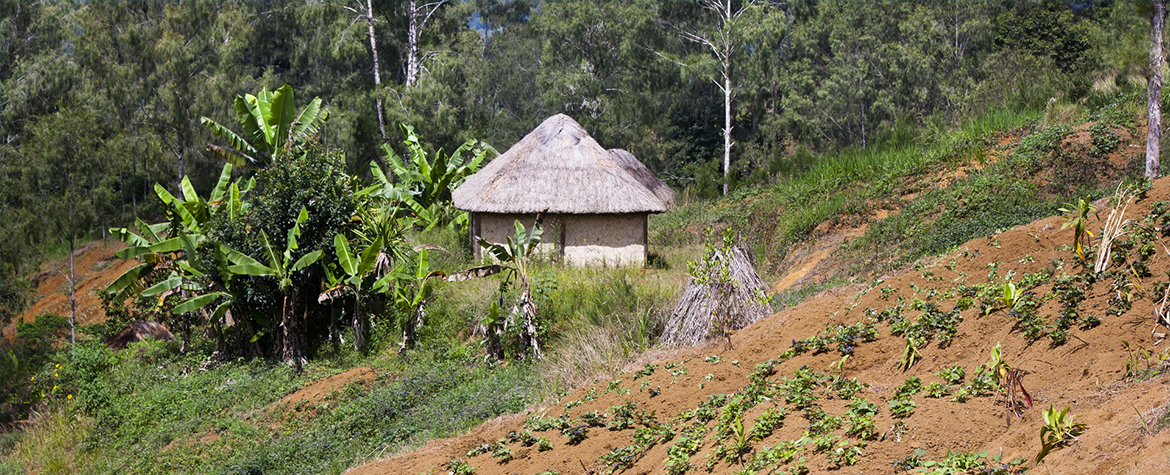RUMINTS IMPACT STORY
Shining a light on solar energy loans
in rural Papua New Guinea
They call themselves the “solar mamas.”
In 2014, 12 women returned to their rural Papua New Guinea homes with a mission. They had been away for six months, studying solar engineering in India. These mothers and grandmothers brought home more than a deft understanding of panels, batteries, and electronics—they brought the promise of transformation for many of the 1.3 million off-grid families in rural Papua New Guinea. Families who lived as subsistence farmers, underserved by banks and loan offices. Families who cooked and studied by the light of noxious, expensive kerosene. Families like that of Cathy Rumints, one of the newly trained engineers.
“Eighty percent of Papua New Guinea’s population does not have electricity, and people still believe that keeping their monies underneath their mattresses will sustain their livelihoods.”
“As an educated woman living in a rural community, I see a great need,” Cathy says. “Eighty percent of Papua New Guinea’s population does not have electricity. At the same time, people still believe that keeping their monies underneath their mattresses will sustain their livelihoods.”
Like the other “solar mamas,” Cathy is tackling these twin exclusions—from the grid and from banking infrastructure—with a bold offensive: micro-loans to finance solar electricity. These loans are part of a pioneering initiative offered by MiBank, the South Pacific’s largest microfinance institution and a committed advocate for global financial inclusion. Telepin powers the initiative with its groundbreaking mobile financial software. The Pacific Financial Inclusion Programme (PFIP), committed to helping low-income Pacific Islanders gain access to inclusion and education, helps fund the pilot program.
It works like this: families use their mobile phones—ubiquitous, even in the most remote areas—to apply for a pay-as-you-go, two-year loan, which they must use to purchase a solar energy kit. The kit, installed with instruction from a trained engineer like Cathy, provides immediate benefits to families who may never have had electricity before. Once the kit is paid off, families continue receiving solar electricity for free. Meanwhile, the mobile micro-loan introduces unbanked families to the concept of banking and its benefits.
The hope is that this initial introduction will entice families to engage with mobile banking more generally, giving them the incentive and the resources to improve their financial literacy and, as a result, their stability. This hasn’t always been easy in rural areas, where banks have rarely or never been accessible; families are used to subsisting without institutional structure, and many don’t see the need to change. That’s where the idea of linking solar electricity to mobile banking began. It ties an abstract notion (using a phone to manage money) to a meaningful, concrete outcome (giving your children better lighting for their homework, or your kitchen better tools for cooking).
Cathy is a believer. “If you want people to buy your products and services, you need to make them want your products and services to help enhance their livelihoods.”
In other words, if clean, affordable solar electricity is the carrot, then mobile banking is the stick. And it appears to be working. Within her own family, Cathy already sees the benefits of this program.
“We grew bulb onions, something that we never grew before, to repay the loan. This has helped to improve our living standards.”
“Financial inclusion has brought a lot of change to my people, but there’s more to be done.”

Already hundreds of other families like Cathy’s have taken advantage of the program, and PFIP is targeting thousands more. The work doesn’t end there, though. As Cathy explains, “There is still lots to do that requires the co-operation of the government, private sector, non-government organizations, and people to make sure the unbanked get services.”
Telepin CEO Vincent Kadar agrees with her. “Papua New Guinea presents interesting challenges and opportunities for a mobile money system,” he says. “This partnership between Telepin and MiBank is just one example of our commitment to promoting financial inclusion within Papua New Guinea and the region through our highly secure and scalable mobile money platform.”
It works like this: families use their mobile phones—ubiquitous, even in the most remote areas—to apply for a pay-as-you-go, two-year loan, which they must use to purchase a solar energy kit. The kit, installed with instruction from a trained engineer like Cathy, provides immediate benefits to families who may never have had electricity before. Once the kit is paid off, families continue receiving solar electricity for free. Meanwhile, the mobile micro-loan introduces unbanked families to the concept of banking and its benefits.
As for Cathy and the other 11 solar engineers, their work continues tirelessly as though they themselves draw energy from the sun above—suggesting, perhaps, a new meaning for the moniker “solar mamas.”
“Financial inclusion has brought a lot of change to my people,” she says. “But there’s more to be done.”
 Powered By Telepin: Tunisie Telecom Revolutionizes Its Charging System - Read More
Powered By Telepin: Tunisie Telecom Revolutionizes Its Charging System - Read More